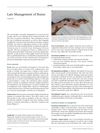 24 citations,
August 2013 in “Facial Plastic Surgery Clinics of North America”
24 citations,
August 2013 in “Facial Plastic Surgery Clinics of North America” Hair restoration surgery can have complications; success depends on patient education, careful planning, and proper execution.
 June 2002 in “Surgery (oxford)”
June 2002 in “Surgery (oxford)” The document says that treating burns late focuses on improving function, appearance, and helping patients return to normal life, using both non-surgical and surgical methods.
 October 2022 in “IntechOpen eBooks”
October 2022 in “IntechOpen eBooks” Hair loss due to scarring can be treated by reducing inflammation, removing scar tissue, and transplanting hair. The Follicular Unit Extraction technique is effective but requires skill and time. Future focus should be on scar-less healing methods.
 8 citations,
February 2012 in “International Journal of Dermatology”
8 citations,
February 2012 in “International Journal of Dermatology” Runners often face skin problems like blisters and infections, and both prevention and early treatment are important.
 1 citations,
July 2023 in “Advances in therapy”
1 citations,
July 2023 in “Advances in therapy” Hair transplantation is safe and effective for children with scar-related hair loss.
 305 citations,
March 2018 in “International journal of molecular sciences”
305 citations,
March 2018 in “International journal of molecular sciences” The document concludes that the understanding of scar formation is incomplete and current prevention and treatment for hypertrophic scars and keloids are not fully effective.
 39 citations,
April 2015 in “Regeneration”
39 citations,
April 2015 in “Regeneration” Lizards can regrow their tails, and studying this process helps understand scar-free healing and limb regeneration.
 January 2016 in “Springer eBooks”
January 2016 in “Springer eBooks” New materials and methods could improve skin healing and reduce scarring.
 5 citations,
September 2012 in “Dermatology Online Journal”
5 citations,
September 2012 in “Dermatology Online Journal” Follicular Unit Extraction (FUE) hair transplant is less invasive, leaves no scars, and has quicker recovery times, but it's more time-consuming and challenging. Automation helps speed up the process and improve graft survival, reducing the need for traditional strip surgery.
April 2024 in “Biomolecules” Exosomal miRNAs from stem cells can help improve skin health and delay aging.
 September 2003 in “Clinics in Family Practice”
September 2003 in “Clinics in Family Practice” Different hair diseases affect people during childbearing years, with treatments ranging from medication to psychological support.
 3 citations,
July 2012 in “British journal of hospital medicine”
3 citations,
July 2012 in “British journal of hospital medicine” The guide helps clinicians diagnose and manage hair loss, detailing examination techniques and treatments for different types of alopecia.
 January 2019 in “ARC journal of pharmaceutical sciences”
January 2019 in “ARC journal of pharmaceutical sciences” Acne can be managed with various treatments and requires psychological support due to its emotional impact.
 126 citations,
April 2015 in “Clinical, cosmetic and investigational dermatology”
126 citations,
April 2015 in “Clinical, cosmetic and investigational dermatology” Choosing the right patients, using proper techniques, and having thorough knowledge are key to preventing and managing dermal filler complications.
 14 citations,
February 1999 in “The BMJ”
14 citations,
February 1999 in “The BMJ” Cosmetic surgery is more popular and cost-effective, but outcomes depend on the surgeon's skill and all procedures have potential complications.
 8 citations,
April 2020 in “Journal of Ethnopharmacology”
8 citations,
April 2020 in “Journal of Ethnopharmacology” Herbs might help with hair loss, but more research is needed to confirm their safety and effectiveness.
 1 citations,
January 2016 in “Journal of gastrointestinal & digestive system”
1 citations,
January 2016 in “Journal of gastrointestinal & digestive system” The new bariatric surgery SAGI PGP is effective for weight loss and diabetes control with few complications.
 October 2018 in “Ayurlog: national journal of research in ayurveda science”
October 2018 in “Ayurlog: national journal of research in ayurveda science” The review suggests that lifestyle, diet, and environment affect hair loss, and Ayurveda offers ways to maintain hair health.
 January 2012 in “Elsevier eBooks”
January 2012 in “Elsevier eBooks” Hair loss can cause emotional and social issues, and various treatments, including medication, surgery, and psychological support, are needed.
 204 citations,
May 2014 in “The Journal of Sexual Medicine”
204 citations,
May 2014 in “The Journal of Sexual Medicine” Hormone therapy for trans individuals is effective and generally safe in the short term.
 10 citations,
October 2017 in “Archivos Argentinos De Pediatria”
10 citations,
October 2017 in “Archivos Argentinos De Pediatria” Most hospitalized children with skin issues were boys, with allergic skin diseases like atopic dermatitis being most common, and treatments were usually topical.
 2 citations,
January 2019 in “International Journal of Medicine in Developing Countries”
2 citations,
January 2019 in “International Journal of Medicine in Developing Countries” Telogen Effluvium is a common hair loss condition, particularly in women, with no specific FDA-approved treatment, and recovery can take up to 18 months.
 January 2020 in “Journal of Pharmacognosy and Phytochemistry”
January 2020 in “Journal of Pharmacognosy and Phytochemistry” The VCO-based herbal hair tonic is effective, safe for hair loss treatment, and can be mass-produced.
 117 citations,
August 2019 in “Drug Design Development and Therapy”
117 citations,
August 2019 in “Drug Design Development and Therapy” Minoxidil effectively treats hair loss, but use cautiously and monitor side effects.
 11 citations,
August 2018 in “Facial Plastic Surgery Clinics of North America”
11 citations,
August 2018 in “Facial Plastic Surgery Clinics of North America” Adipose-derived stem cells show potential for skin rejuvenation and wound healing but require more research to overcome challenges and ensure safety.
 5 citations,
December 2020 in “BMC Dermatology”
5 citations,
December 2020 in “BMC Dermatology” Bariatric surgery improves skin conditions and metabolism but may cause nutritional deficiencies and hair loss.
 2 citations,
October 1997 in “Dermatologic Clinics”
2 citations,
October 1997 in “Dermatologic Clinics” The document concludes that advancements in hair restoration surgery have led to more natural results and patient satisfaction, with hope for future improvements in treatment.
 1 citations,
November 2014 in “Elsevier eBooks”
1 citations,
November 2014 in “Elsevier eBooks” Future research should focus on making bioengineered skin that completely restores all skin functions.
 18 citations,
June 2019 in “Clinical research in dermatology”
18 citations,
June 2019 in “Clinical research in dermatology” Acne can't be cured but can be managed with treatments like benzoyl peroxide and diet changes; it's costly and can lead to scarring and mental health issues.
April 2024 in “International journal of molecular sciences” Combination pharmacotherapy is generally more effective for treating keloids and hypertrophic scars.




























